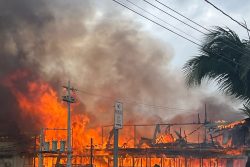The Guyana Human Rights Association (GHRA) last week convened a meeting of more than a dozen civic organisations that agreed to advocate on immediate environmental priorities.
According to a press release from the GHRA, the meeting, which was convened last Saturday, was a response to concerns that governance arrangements in Guyana, particularly civic involvement in policymaking, are weak and overly dependent on listless statutory bodies, as well as the stated intention of the new government to address governance matters.
The GHRA said the meeting identified two major areas in which quality civic involvement is critical: Guyana’s position on climate change to be presented at the global conference COP21, scheduled for December; and Guyana’s candidacy in the Extractive Industries Transparency Initiative (EITI.)
In the GHRA’s view, the priority areas are “deeply impacted” by the lack of coherence in Guyana’s policies in which economic extractions and environmental priorities are in conflict with each other.
Moving forward, the GHRA said the meeting agreed to monitor Guy-ana’s official draft document to the COP21, which is currently being prepared. In addition, the groups expect to mobilise constructive engagement and discussion with the decision makers on this issue.
The COP21 draft document is expected to be formulated as Intended Nationally Determined Contributions (INDC), which effectively are commitments Guyana will make to the international community as a country to reduce global warming and regulate climate change.
To aid the COP21 process, the collective civic body has agreed on a community outreach on climate change through the teaching of global warming in primary and secondary schools. “The link between climate change and serious coastal flooding is well-established and as a critical area of knowledge and consciousness-raising must be passed down to future generations of Guyanese,” the GHRA added.
In a notice published in yesterday’s Stabroek News, the Department of Natural Resources and the Environment noted that the Ministry of the Presidency is currently preparing a draft INDC for COP21, which is to be held in Paris, France. Towards this end, the department announced the holding of a National Stakeholders Consultation at 9am on Wednesday, September 9th at the Grand Coastal Hotel, at Le Ressouvenir. All stakeholders have been invited to participate.
Meanwhile, as it relates to the EITI, the GHRA noted the new coalition government has committed to complete the formalities for Guyana’s candidate status by late February, 2016. It is anticipated that there would be the creation of a tripartite stakeholder committee to manage the process, which will comprise of government agencies, representatives of the extractive industry and civil society. To this end, the tripartite mechanism, according to the GHRA, is intended to foster a collective commitment to compromise, tolerance and empathy, and also to conclude the preparations over a six month period, starting in September, 2015 and concluding in February, 2016.
It is also expected that the EITI process will involve “a communications strategy aimed at generating popular interest and understanding of the EITI and its aims,” the GHRA said. In addition to targeting the youth population in that process, it is expected that the initiative will have training opportunities on the functioning of the EITI, it added.
A total of 25 civic organisations were invited to the meeting and 15 attended and five communicated their inability to attend. The organisations present at the meeting included the Benab Foundation, Guyana Citizens Initiative (GCI), Guyana Environment Initiative, GHRA, Guyana Organisation of Indigenous People (GOIP), Jesuits in Guyana, National Toshaos Council (NTC), Red Thread, Rights of Children (ROC), Rotaract-UG, Santa Rosa Village Coun-cil, Transparency Institute Guyana Inc (TIGI), University of Guyana Students Society (UGSS) and the Ursuline Sisters in Guyana.









